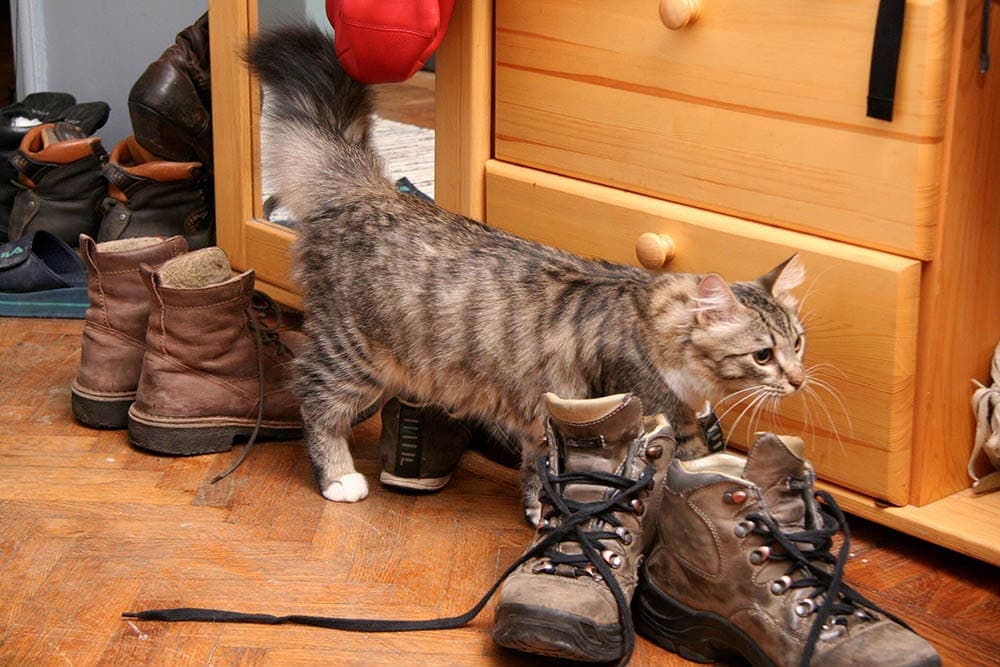
Click to Skip Ahead
Cat urine smells terrible! What is worse is that the smell seems to linger for so long, even after it’s been cleaned up. Luckily, getting cat urine out of your hardwood floors is easier than it seems. This article goes over a few quick steps that will get the smell of cat urine out of your house.
Hardwood Floors and Cat Urine
Some people might think that cleaning cat urine smells from hardwood is easier than cleaning smells from a carpet. Well, it all depends on the type of hardwood floor you have. If your hardwood has been well-sealed to keep moisture out, this is good news! The cat urine will not have absorbed into the wood, making it easier to wipe away the smell.
However, if your flooring is pre-finished, then it has not been sealed as effectively as the above-mentioned flooring. While some pre-finished hardwood flooring has been stained, the stain is not as effective as keeping some urine from being absorbed. If your floor is site-finished, that means the floor is raw and has not been treated at all. Cat urine will greatly affect this kind of wood flooring.
If your hardwood floor has been well-sealed, the following steps can help you locate and eradicate cat urine odors.
How to Remove Old Cat Urine From Hardwood Floors
1. Mix Peroxide & Baking Soda in the Spray Bottle
Peroxide and baking soda are going to be your DIY cat urine finder. Cat urine releases ammonia as bacteria break down the urea, and ammonia turns white when exposed to peroxide and baking soda.
2. Spray Suspect Areas
Start by lightly spraying areas you suspect of having old cat urine. If the area turns white, you’ve got a hit!
3. Thoroughly Saturate Affected Areas With Your Enzyme Cleaner
If you're trying to find an enzyme cleaner that does it all, we highly recommend our favorite cleaner, the Hepper Advanced Bio-Enzyme Pet Stain & Odor Eliminator Spray.
- ADVANCED ENZYMATIC CLEANER - Penetrates the most stubborn smells and stains at the deepest molecular...
- FOR ANY MESS, ON ANY SURFACE - This pet odor eliminator cleans your carpets, floors, furniture,...
- FRESH, NATURAL ODOR - Our unique formulation doesn't rely on dangerous or unpleasant chemical...
It permanently removes the very worst stains and smells you can imagine and makes clean up a breeze. There's even a 100% satisfaction guarantee! Click here to order a bottle today.
At Pet Keen, we’ve admired Hepper for many years, and decided to take a controlling ownership interest so that we could benefit from the outstanding products of this cool cat company!
Enzyme cleaners are the only 100% effective way to neutralize the smell of cat urine permanently. Uric acid is an exceptionally tenacious substance for cleaning products, and no matter how thoroughly you clean, an enzyme cleaner is the only way to get the smell out for good.
4. Allow Site to Air Dry Completely
It’s crucial to allow your enzyme cleaner to air dry. Drying the site with a hairdryer will reduce the efficacy of the solution.
What If My Floor Is Untreated?
If your hardwood floor has little to no staining or treatment, you can always try the above methods. However, depending on how long the urine has been there, you might have to use a sander to get rid of the urine smell. That is the worst-case scenario. A sander will remove a thin layer of the untreated wood that the cat has urinated on.
Usually, sanding wood requires some know-how, and many people feel better reaching out to professionals to have their floors sanded. But this is the last resort option. Definitely try cleaning the area first before you start sanding away at your floors!
Why Does Cat Urine Smell So Bad Anyway?
Cat urine comprises many chemical components, but the most responsible for its terrible smell are urea and uric acid. Urea releases ammonia as bacteria break it down, contributing to the harsh, burning ammonia smell you often get near your cat’s litter box. Meanwhile, uric acid contributes that acrid, tangy scent that lingers for years after a cat has urinated on something they’re not supposed to.
How Long Does Cat Urine Odor Last?
Cat urine odor can last for a surprisingly long amount of time, even if your cat doesn’t regularly have accidents. While the ammonia smell should clear up shortly after you clean up the mess, the uric acid smell can hang around for years since uric acid has a half-life of six years when soaked into a porous surface like wood; that means it will take six years for the uric acid to completely break down and dissipate unless removed by an enzyme cleaner.
The ammonia smell may not go away right away either, depending on how long the urine was sitting out before it got cleaned up. If the urea permeates a porous surface, it will be harder to get rid of the smell, and you’ll likely have to wait for the bacteria to finish breaking it down for the smell to go away completely.
A consistent smell of uric acid doesn’t always mean your cat continues to pee outside of the litter box. Humid weather can cause uric acid to recrystallize and bring back the smell even when the urine is years old.

How Do Enzyme Cleaners Work?
Enzyme cleaners work by breaking down uric acid into gasses which evaporate as the solution air dries. That’s why it’s crucial to allow your enzyme cleaner to air dry. If you don’t let your enzyme cleaner air dry, the uric acid may not fully evaporate and might recrystallize later.
Can You Make Enzyme Cleaners at Home?
Even if you had access to the correct chemicals needed to break down uric acid, an untrained hand would not have the chemistry knowledge to mix the solution correctly. While making the solution yourself may be tempting, it’s probably more practical to rely on a solution mixed by a machine to ensure that the measurements are exact.
Final Thoughts
Depending on the type of hardwood flooring you have, removing cat urine is not hard work. But it can seem like an impossible task if you are going at it with unsuitable materials. Luckily, there are cost-effective ways to find and neutralize the smell of cat urine permanently. So, even if your hardwood floor is not sealed, give the above method a try! You may find old cat urine that’s saturated the hardwood floor with a homemade solution, and an enzyme cleaner should permanently neutralize the scent once you’ve found it.
Featured Image Credit: StockSnap, Pixabay







